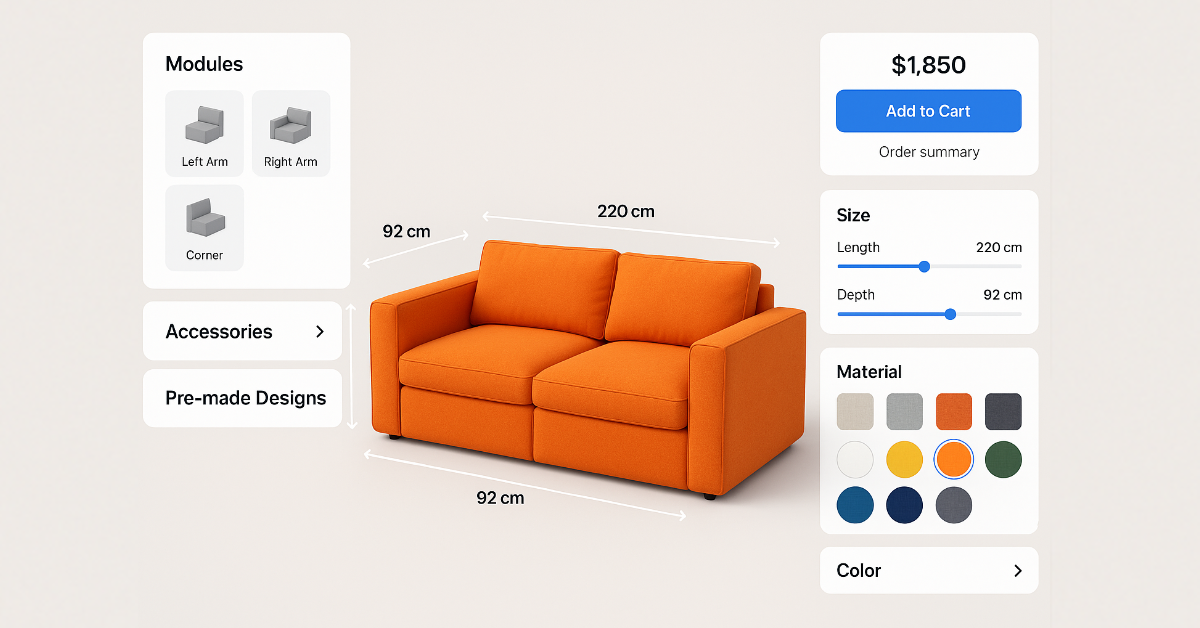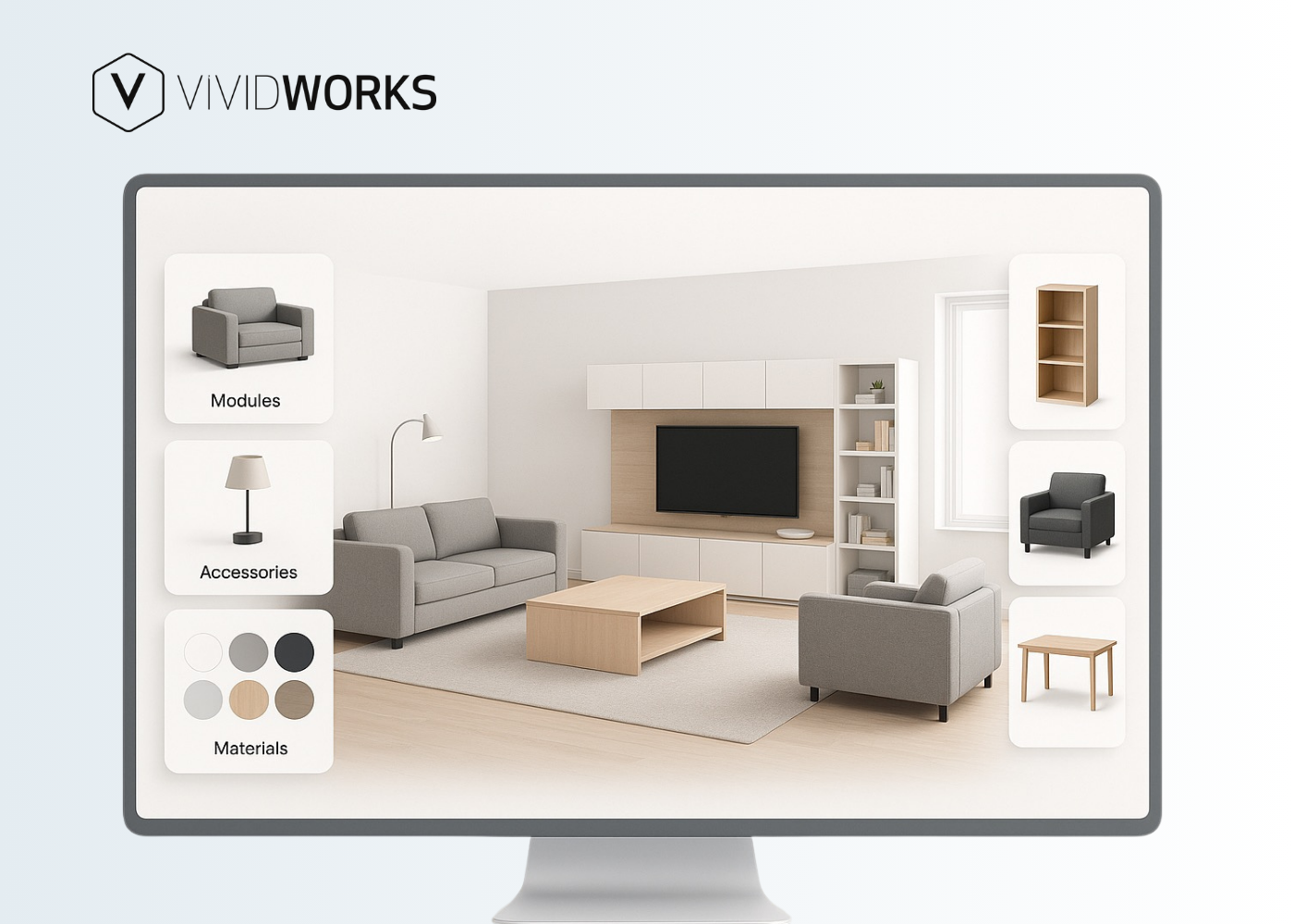Furniture eCommerce is a potential but challenging market for many sellers. Customers can’t physically touch or visualize how a piece will fit into their real space, especially with highly configurable products. Static 2D visuals simply fail to convey an authentic look. Everyone might be left unsure, causing hesitation in purchasing and abandoning carts.
That’s when 3D tools are transforming the game, offering immersive experiences. You can easily interact with products from 360 degrees and gain deeper engagement. This helps boost shopper trust, encourages informed decisions, and drives conversion rates.
Right now, keep scrolling to the following parts to discover how these 3D tools support!
3D Common Solutions for Furniture eCommerce
In fact, merchants in furniture eCommerce can use a range of 3D tools to transform their long-term performance. Below are the key solutions that you should consider firsthand:
- 3D Viewers
This 3D technology lets designers or professionals explore and evaluate 3D models of furniture pieces in precise dimensions. Most 3D viewers today can support standard 3D file formats, like .fbx, 3mf, or .obj, and product designs from AutoCAD, DXF, and Revit RVT.
- 3D Product Configurators
3D configurators are an advanced visual Configure, Price, Quote (CPQ) solution that goes beyond 3D viewing to empower users to configure and price furniture in real-time. You can freely design, customize, and visualize highly modular items in custom colors, materials, dimensions, or more. The configurator will automatically update 3D visualizations, prices, and quotes as changes are made. As a result, online sellers can ensure a more responsive design for furniture eCommerce.

- Augmented Reality (AR)
One of the emerging 3D eCommerce trends in 2025 is AR, which is highly valued for enhancing customer experiences. Everyone can virtually place furniture in their own environment to see how an item fits within their space, down to scale and proportion. This helps drive more confidence in customer choices, further reducing product returns.
1. Building Trust Through Realistic Product Visualization
Challenges of Static 2D Images
While static 2D images are familiar and easy to create, they showcase limitations for furniture eCommerce websites. Furniture is a high-consideration purchase: complex, costly, bulky, and style-sensitive. And a flat visual could not fully convey crucial details. This potentially results in unmet expectations upon delivery and more product returns.
How 3D Tools Strengthen Trust and Boost Purchase Confidence
Apparently, 3D visualizations provide a far more realistic and interactive experience. Shoppers can explore furniture from every angle, zoom in to inspect finishes, and rotate pieces, leading to a deeper and more precise understanding of what they’re purchasing.
Additionally, AR and 3D room planning, often built with furniture 3D configurators, enable context-aware rendering. The furniture pieces can be seen in different room settings, which is critical to reducing the gap between online browsing and real-world perception. This clarity significantly reduces purchase hesitation and enhances shopper confidence.
2. Enabling Personalization with 3D Configurators
Why Personalization Matters in Furniture eCommerce
According to a 2025 report, 84% of consumers prefer personalized shopping activities. This highlights exactly why eCommerce customer experiences matter more than ever. Furniture is a profoundly personal purchase. It is often tied to individual taste, space limitations, and lifestyle demands. Thus, offering tailored options is especially important.
Personalization Drives Higher AOV and Conversion
When shoppers can configure products and instantly see the changes, they might gain satisfaction and are more likely to make a purchase. In fact, products offering real-time customization through 3D/AR experiences can see up to a 94% increase in conversion rates compared to static or 2D product displays. Additionally, personalized options often encourage customers to upgrade features or add complementary items for higher AOV.
Apparently, embracing personalization with 3D configurators can drive revenue growth, effectively positioning brands at the forefront of the competitive furniture e-commerce.
3. Enhancing Engagement and Reducing Bounce Rates
3D Tools Increase Time on Site
3D technology serves as a powerful magnet for user engagement in your furniture store. Unlike 2D images, 3D visualizations embrace more aesthetic appeal, encouraging users to spend more time interacting with products. The more time buyers spend exploring and customizing, the stronger their connection to the brand and its offerings becomes.
Reducing Bounce Through Immersive UX
While intuitive navigation and streamlined checkouts are essential to the eCommerce experience examples, user experience (UX) in the furniture industry must go even further. That’s where immersive tools like 3D configurators, AR, and 3D viewers come in. Customers can visualize, configure, and even place furniture in their real environments.
Moreover, 3D configurators with Configure, Price, and Quote (CPQ) can drive more engagement. You can instantly see how changes to features impact the final cost, making the purchasing journey more transparent and ensuring more informed decisions.
Successful Brands Leveraging 3D Tools in Furniture eCommerce
Furniture eCommerce brands, such as Grand + Benedicts, IKEA, or Blå Station, are successfully unlocking the power of 3D configurators, 3D viewers, and AR. These technologies engage buyers effectively and position these brands as the market leaders.
- Grand + Benedicts
Grand + Benedicts, a shelving system provider, transformed its sales process and brought a true-to-life shopping experience by implementing VividWorks 3D product configurator. This lets users adjust dimensions, colors, and finishes and view them all in 360 degrees.
Every customization made is instantly reflected in real-time prices and quotes, ensuring the highest level of accuracy. Moreover, AR supports the visualization of the final designs in your real-world environment, helping you evaluate exactly how shelves fit your space.
Try a demo empowered by VividWorks to discover the possibilities of 3D technologies!
- AUDO
AUDO has partnered with VividWorks to add a Frame 3D Configurator to their Shopify store. With this solution, customers can freely build their own frame, select modules, accessories, and materials to finish their own cabinets based on their specific demands. AUDO also includes the Choose The Right Size Guideline to help customers make confident decisions about cabinet dimensions for a perfect fit in their real-world spaces.
- Blå Station
Blå Station is a Swedish furniture company known for innovative public space sofas and seating solutions. It uses a 3D configurator called "BOB Planner" that empowers users to customize modular sofas online effortlessly. Thanks to real-time 3D visualizations, customers also feel less confused when ordering such a highly modular item like sofas.
Conclusion: Why 3D Is No Longer Optional for Furniture eCommerce
The shift towards 3D tools in furniture eCommerce is more than just a passing trend. It’s a fundamental transformation of the online shopping experience. By using them properly, you can boost buyer trust with realistic visualizations, enabling profound personalization through 3D configurators, and enhance engagement for improved revenues effectively.
Talk to us to learn more about 3D configuration and find the best solution for your brand!
Table of Content
-3.avif)
Streamline your process today!







